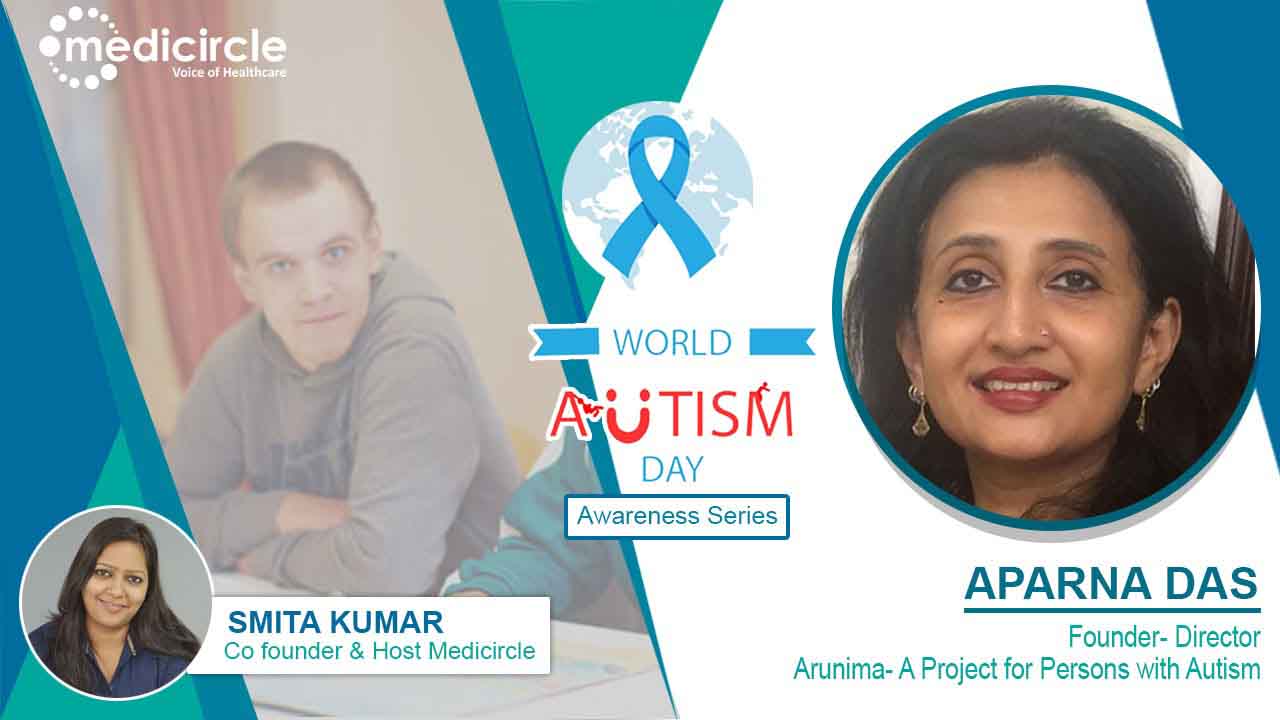Autism is a complex lifelong developmental disability that typically appears during early childhood and can impact a person’s social skills, communication skills, relationships, and self-regulation. Autism impacts individuals throughout their lifespan. However, research shows that early diagnosis can lead to improvisation, improve the quality of life. So early detection, diagnosis, and interventions are really important. At Medicircle we present you the World Autism Day Awareness Series, where we are featuring eminent Pediatric Neurologists, Speech therapists, Clinical Psychologists, and also people who are helping them out to lead a better life. I think through these initiatives, we are able to build a better awareness of the signs, symptoms and realities of Autism.
Aparna Das is the founder and director of “Arunima” a project for persons with Autism. Aparna has over two decades of experience in the field of special needs.
Autism is increasing at a faster rate
Aparna informs, “The exact reason behind Autism is still a mystery. There are many hypotheses attached to this and every day there is a new discovery in the field of Autism. Hypothesis shows that it may be due to the father’s advanced stage or due to any environmental pollutants. Twin studies show strong evidence that proves genetic as the main cause of Autism. If one of the twins has Autism, then the other may also have as they share the same genes. Studies have concluded that two individuals can have the same signs and symptoms, but the reasons might be different. Type of Autism also depends upon the factor causing Autism. Clarity of exact cause is still lacking. Autism is increasing at a faster rate. Decades ago, it was 1 in 1000 and now this has been increased to 1 in 35. It is a way of life and we have to accept that. It would be better to accept the reality rather than denying it.”
Inclusion is very important
Aparna explains, “After diagnosing the disorder, inclusion is very important. One should not isolate the person after getting diagnosed with Autism. We should create an ideal world for them, where they are accepted and loved. Initiatives are being taken to spread awareness amongst the general public. Awareness helps in improving inclusion. An individual with Autism often have some problems – they find difficult to understand and express language. We need to interact in a particular way so that they don’t get confused. They may have some sensory issues so we should try to create a friendly environment as per their likes, dislikes, then only they will participate and feel secure. There is a need for a multidimensional approach. This all will help in inclusion. This is going to be an ideal environment for them to blossom and a good start of therapy.”
Early detection and early intervention are very important
Aparna expresses, “Autism is a social disability and not a physical disorder. Doctors should work on social milestones too – is he responding to name calls, is he following joint attention, is he able to reach out to his mother, is he showing interest in surroundings, is he sharing a social smile. If these social signs get detected at right time, this will create awareness in parents too. Urban doctors can try reaching out to rural doctors and train them also. One should share and spread awareness in rural areas as there is a lack of diagnosing and treatment facilities. Early detection and early intervention are of utmost importance. If will start early, we will have more time to teach them. They are more flexible in young ages to accept what is being taught because after attaining a certain age, we generally do not accept changes easily.”
Childs with Autism are not easily accepted in society
Aparna stresses, “Generally, parents put these kids in playschool when they are 3-4 years old. Unknowingly parents keep on pushing the child to cope up with other students. After a certain point, other kids in the class start bullying them because of their different behavior. They are treated very badly and are not easily accepted in schools too, which hurt them a lot. After all this, teachers take out this child from school and put them in some vocational training institute where they are taught to prepare candles, paper bags. But this is not going to help them in their life. This will not make them independent.”
Basic life skills are very much essential
Aparna shares, “Our main focus is to teach them basic life skills. First of all, they need to be taught basic life skills. They should be taught to take care of themselves by performing all their daily activities by themselves. They should be able to keep living space clean, they should be able to help with household chores, they should be able to help with outdoor stuff, should be able to manage their time. There are some individuals who need 24 hours care and support while there are some who are independently doing their work, they run their own life by doing everything themselves. We want to give them an opportunity so that they can lead a respectful dignified safe life and should be independent to their maximum extent. We should stop stigmatizing it, in fact, they should be treated with more and more empathy. We provide the support that is customized, individualized as per their needs.”
Website – www.projectarunima.org
FB – Arunima: A project for Adults with Autism
(Edited by - Renu Gupta)

 “Autism is a social disability and not a physical disorder. After diagnosing, inclusion is very important. There is a need for a multidimensional approach. It would be better to accept the reality rather than denying it,†shares Aparna Das, Founder and Director of Arunima
“Autism is a social disability and not a physical disorder. After diagnosing, inclusion is very important. There is a need for a multidimensional approach. It would be better to accept the reality rather than denying it,†shares Aparna Das, Founder and Director of Arunima


































